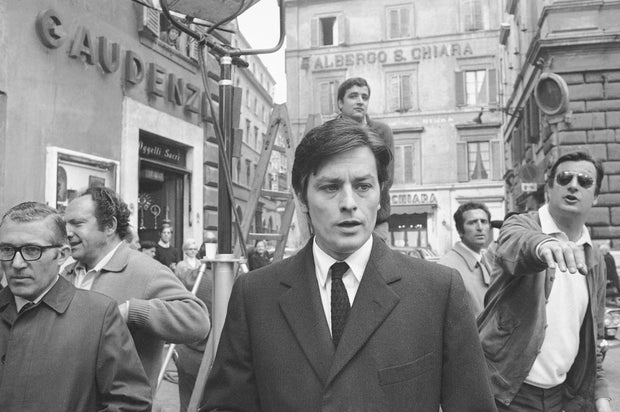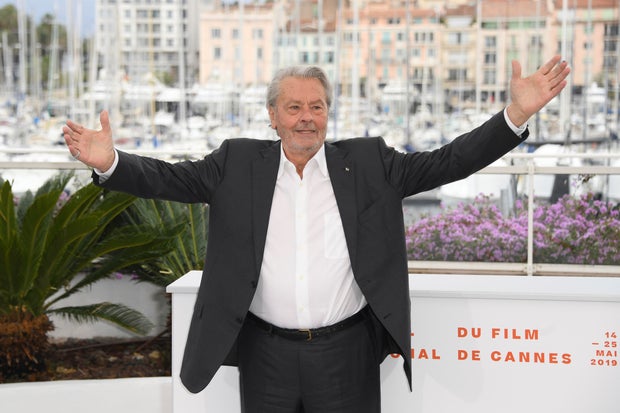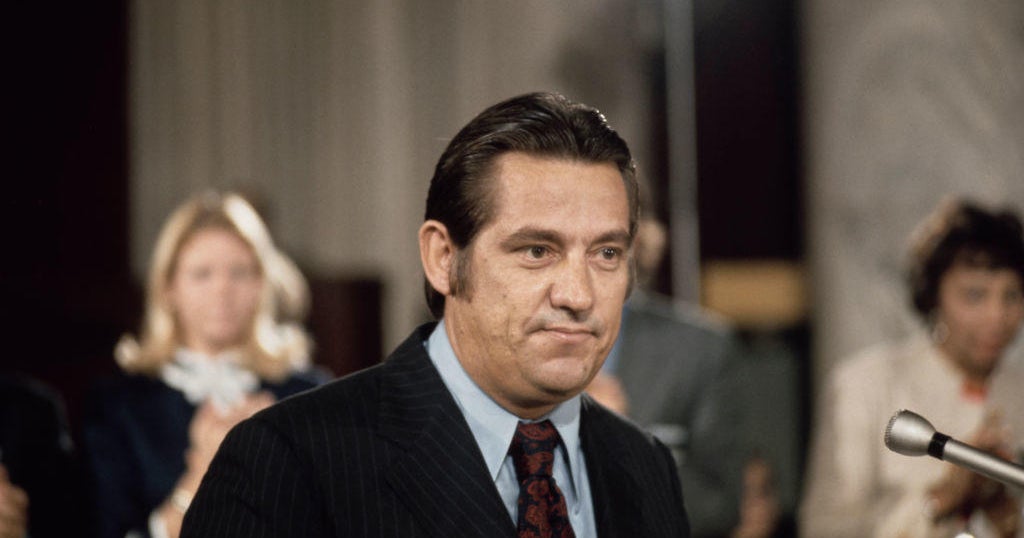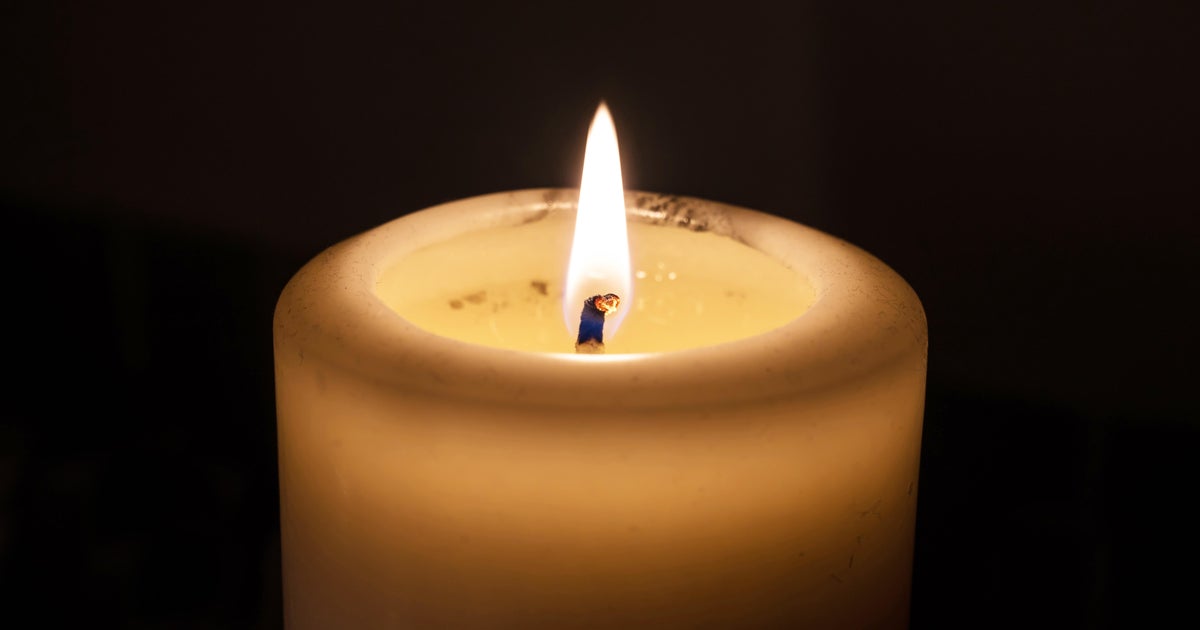CBS News
Alain Delon, French acting legend, dies at 88

Alain Delon, the internationally acclaimed French actor who embodied both the bad guy and the policeman and made hearts throb around the world, died at age 88, his family told French media.
“Alain Fabien, Anouchka, Anthony, as well as (his dog) Loubo, are deeply saddened to announce the passing of their father. He passed away peacefully in his home in Douchy, surrounded by his three children and his family,” the actor’s children said in a statement to AFP, which is a common practice in France.
Jim Pringle / AP
With his handsome looks and tender manner, the prolific actor was able to combine toughness with an appealing, vulnerable quality that made him one of France’s memorable leading men.
Delon was also a producer, appeared in plays and, in later years, in television movies.
Tributes to Delon immediately started pouring in on social platforms, and all leading French media switched to full-fledged coverage of his rich career.
French President Emmanuel Macron paid tribute on X to “a French monument.”
“Alain Delon has played legendary roles and made the world dream,” he wrote. “Melancholic, popular, secretive, he was more than a star.”
Earlier this year, his son Anthony had said his father had been diagnosed with B-cell lymphoma, a type of cancer.
Over the past year, Delon’s fragile health condition had been at the heart of a family dispute over his care that gave rise to bitter exchanges through the media among his three children.
At the prime of his career, in the 1960s and 1970s, Delon was sought out by some of the world’s top directors, from Luchino Visconti to Joseph Losey.
In his later years, Delon grew disillusioned with the movie industry, saying that money had killed the dream. “Money, commerce and television have wrecked the dream machine,” he wrote in a 2003 edition of the newsweekly Le Nouvel Observateur. “My cinema is dead. And me, too.”
But he continued to work frequently, appearing in several TV movies in his 70s.
Arthur Mola/Invision/AP
Delon’s presence was unforgettable, whether playing morally depraved heroes or romantic leading men. He first drew acclaim in 1960 with “Plein Soleil,” directed by Réne Clément, in which he played a murderer trying to take on the identity of his victims.
He made several Italian movies, working, most notably with Visconti in the 1961 film “Rocco and His Brothers,” in which Delon portrays a self-sacrificing brother intent on helping his sibling. The movie won the Special Jury Prize at the Venice Film Festival.
The 1963 Visconti film “Le Guepard” (The Leopard) starring Delon won the Palme d’Or, the highest honor at the Cannes Film Festival. His other films included Clément’s “Is Paris Burning,” with a screenplay by Gore Vidal and Francis Ford Coppola among others; “La Piscine” (The Sinners), directed by Jacques Deray; and, in a departure, Losey’s “The Assassination of Trotsky” in 1972.
In 1968, Delon began producing movies — 26 of them by 1990 — part of a frenzied and self-assured momentum that he maintained throughout his life.
Delon’s confidence was palpable in his statement to Femme in 1996, ‘I like to be loved the way I love myself!’ This echoed his charismatic screen persona.
Delon continued to captivate audiences for years — on the way courting criticism for comments deemed outdated. In 2010, he appeared in “Un mari de trop” (“One Husband Too Many”) and returned to the stage in 2011 with “An Ordinary Day,” alongside his daughter Anouchka.
He briefly presided over the Miss France jury but stepped down in 2013 after a disagreement over some controversial statements, which included critiques on women, LGBTQIA+ rights, and migrants. Despite these controversies, he received a Palme d’Honneur at the 2019 Cannes Film Festival, a decision that sparked further debate.
The Brigitte Bardot Foundation, dedicated to animal protection, paid tribute to “an exceptional man, an unforgettable artist and a great friend of animals,” in a statement released on social media. Delon was “a close friend” of French film legend Brigitte Bardot “who is deeply saddened by his passing,” the statement said. “We lose a precious friend and a man with a big heart.”
French film producer Alain Terzian said Delon was “the last of the giants.”
“It’s a page being turned in the history of French cinema,” he told France Inter radio. Terzian, who produced several films directed by Delon, recalled that “every time he arrived somewhere … there was a kind of almost mystical, quasi-religious respect. He was fascinating.”
Born on Nov. 8, 1935, in Sceaux, just south of Paris, Delon was placed with a foster family after his parents’ separation when he was 4. He then attended a Roman Catholic boarding school.
At 17, Delon joined the navy and was sent to Indochina. Back in France in 1956, he held various odd jobs from waiter to a carrier in the Paris meat market before turning to acting.
Delon had a son, Anthony, in 1964 with his then-wife Nathalie Canovas, who played alongside him in Jean-Pierre Melville’s “The Samurai” in 1967. He had two more children, Anouchka and Alain-Fabien, with a later companion, Rosalie van Breemen, with whom he produced a song and video clip in 1987. He was also widely believed to have been the father of Ari Boulogne, the son of German model and singer Nico, although he never publicly acknowledged paternity.
“I am very good at three things: my job, foolishness and children,” he said in a 1995 L’Express interview.
Delon juggled diverse activities throughout his life, from setting up a stable of trotting horses to developing cologne for men and women, followed by watches, glasses and other accessories. He also collected paintings and sculptures.
Delon announced an end to his acting career in 1999, only to continue, appearing in Bertrand Blier’s “Les Acteurs” (The Actors) the same year. Later he appeared in several television police shows.
His good looks sustained him. In August 2002, Delon told a weekly magazine, L’Humanite Hebdo, that he wouldn’t still be in the business if that weren’t so.
“You’ll never see me old and ugly,” he said when he was already nearing 70, “because I’ll leave before, or I’ll die.”
However, it was in 2019 that Delon encapsulated his feelings about his life’s meaning during a gala event honoring him at the Cannes Film Festival. “One thing I’m sure about is that if there’s something I’m proud of, really, the only thing, it’s my career.”
CBS News
“All hands on deck” for Idaho’s annual potato harvest

Watch CBS News
Be the first to know
Get browser notifications for breaking news, live events, and exclusive reporting.
CBS News
Taste-testing “Sandwiches of History” – CBS News

Watch CBS News
Be the first to know
Get browser notifications for breaking news, live events, and exclusive reporting.
CBS News
“Sandwiches of History”: Resurrecting sandwich recipes that time forgot

Barry Enderwick is eating his way through history, one sandwich at a time. Every day from his home in San Jose, California, Enderwick posts a cooking video from a recipe that time forgot. From the 1905 British book “Salads, Sandwiches and Savouries,” Enderwick prepared the New York Sandwich.
The recipe called for 24 oysters, minced and mixed with mayonnaise, seasoned with lemon juice and pepper, and spread over buttered day-old French bread.
Rescuing recipes from the dustbin of history doesn’t always lead to culinary success. Sampling his New York Sandwich, Enderwick decried it as “a textural wasteland. No, thank you.” Into the trash bin it went!
But Enderwick’s efforts have yielded his own cookbook, a collection of some of the strangest – and sometimes unexpectedly delicious – historical recipes you’ve never heard of.
Harvard Common Press
He even has a traveling stage show: “Sandwiches of History Live.”
From the condiments to the sliced bread, this former Netflix executive has become something of a sandwich celebrity. “You can put just about anything in-between two slices of bread,” he said. “And it’s portable! In general, a sandwich is pretty easy fare. And so, they just have universal appeal.”
Though the sandwich gets its name famously from the Fourth Earl of Sandwich, the earliest sandwich Enderwick has eaten dates from 200 B.C.E. China, a seared beef sandwich called Rou Jia Mo.
He declared it delicious. “Between the onions, and all those spices and the soy sauce … oh my God! Oh man, this is so good!”
While Elvis was famous for his peanut butter and banana concoction, Enderwick says there’s another celebrity who should be more famous for his sandwich: Gene Kelly, who he says had “the greatest man sandwich in the world, which was basically mashed potatoes on bread. And it was delicious.”
Whether it’s a peanut and sardine sandwich (from “Blondie’s Cook Book” from 1947), or the parmesian radish sandwich (from 1909’s “The Up-To-Date Sandwich Book”), Enderwick tries to get a taste of who we were – good or gross – one recipe at a time.
RECIPE: A sophisticated club sandwich
Blogger Barry Enderwick, of Sandwiches of History, offers “Sunday Morning” viewers a 1958 recipe for a club sandwich that, he says, shouldn’t work, but actually does, really well!
MORE: “Sunday Morning” 2024 “Food Issue” recipe index
Delicious menu suggestions from top chefs, cookbook authors, food writers, restaurateurs, and the editors of Food & Wine magazine.
For more info:
Story produced by Anthony Laudato. Editor: Chad Cardin.










